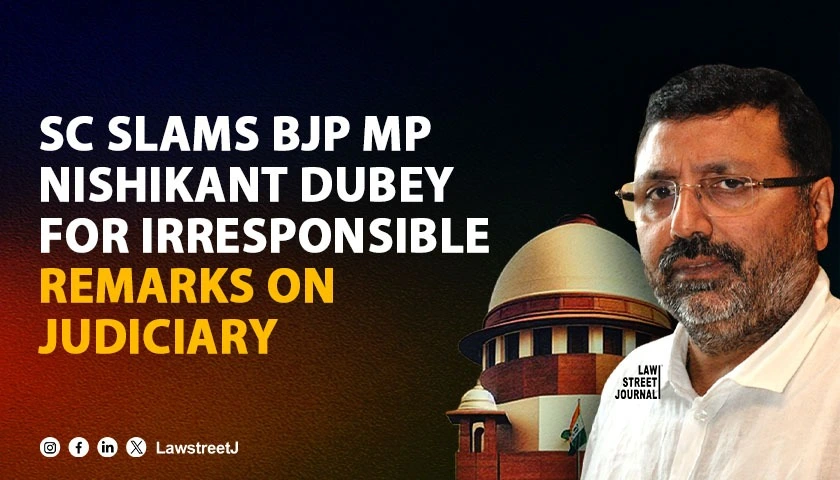NEW DELHI: The Supreme Court has come down heavily upon BJP MP Nishikant Dubey for "highly irresponsible comments" for those reflected a penchant to attract attention by casting aspersions on the apex court and its judges.
Without taking any contempt action, a bench of Chief Justice of India Sanjiv Khanna and Justice Sanjay Kumar also pointed out those remarks showed ignorance about the role of the constitutional courts and the duties and obligations bestowed on them under the Constitution.
"We are of the firm opinion that courts are not as fragile as flowers to wither and wilt under such ludicrous statements. We do not believe that the confidence in and credibility of the courts in the eyes of the public can be shaken by such absurd statements, though it can be said without the shadow of doubt that there is a desire and deliberate attempt to do so," the bench said.
Following the Supreme Court's order in a matter related to Waqf Amendment Act, 2025, Dubey had said, "the Supreme Court is taking the country towards anarchy and that the CJI Sanjiv Khanna is responsible for the civil wars taking place in the country".
He had made those comments on April 19, saying Parliament and state assemblies should be shut if the apex court has to make laws.
"We are not entertaining the writ petition, we make it clear that any attempt to spread communal hatred or indulge in hate speech must be dealt with an iron hand," the bench said.
The court said, hate speech cannot be tolerated as it leads to loss of dignity and self-worth of the targeted group members, contributes to disharmony amongst groups, and erodes tolerance and open-mindedness, which is a must for a multi-cultural society committed to the idea of equality.
"Any attempt to cause alienation or humiliation of the targeted group is a criminal offence and must be dealt with accordingly," it said.
In its order in a petition filed by advocate Vishal Tiwari, the bench said the contents of the assertions, no doubt tend to scandalise and lower the authority of the Supreme Court, if not interfere or tend to interfere with the judicial proceedings pending before this court, and have the tendency to interfere and obstruct the administration of justice.
"The statements reflect the clear intent to impute motives to the bench itself by naming the Chief Justice of India as “responsible for all the civil wars happening in India” and “in order to incite religious wars in this country, it is only and only the Supreme Court that is responsible”. There is no ‘civil war’ in India," the bench said.
However, the bench said, "Every commission of contempt need not erupt in an indignant committal or levy of punishment, howsoever deserving it may actually be".
Citing In Re S Mulgaokar (1978), the bench said, it is so because judges are judicious, their valour non-violent and their wisdom springs into action when played upon by a volley of values, the least of which is personal protection. Courts believe in values like free press, fair trial, judicial fearlessness and community confidence. Thus, courts need not protect their verdicts and decisions by taking recourse to the power of contempt. Surely, courts and judges have shoulders broad enough and an implicit trust that the people would perceive and recognize when criticism or critique is biased, scandalous and ill-intentioned, the bench said.
The court said judicial pronouncements result in an order or a decision which may aggrieve a party or sometimes a section of the public.
"Critical analysis and objective criticism of an order’s reasoning or even its outcome is protected under the fundamental right to free speech and expression under clause (a) of Article 19(1) of the Constitution," the court said.
It emphasised, the power of judicial review is conferred by the Constitution on the judiciary. Statutes are subject to judicial review to test their constitutionality as well as for judicial interpretation. Therefore, when the constitutional courts exercise their power of judicial review, they act within the framework of the Constitution.
The court also said that “each branch of the state in a democracy, be it the legislature, executive or the judiciary, especially in a constitutional democracy, acts within the framework of the Constitution”.
“It is the Constitution that is higher than all of us. It is the Constitution which imposes limits and restrictions on the powers vested in the three organs," the bench said.















